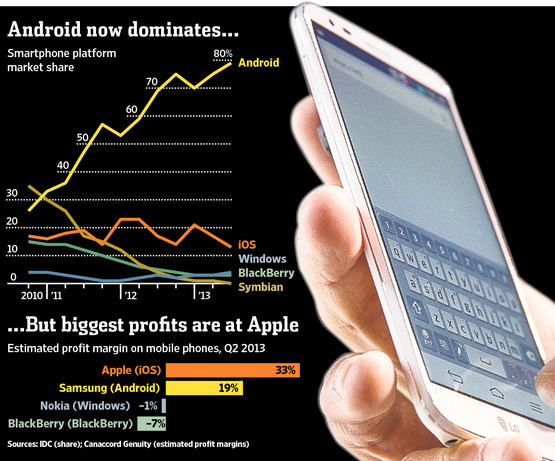Far from it’s lowly days as the little operating system that could, Android has squeezed out both incumbents and newcomers alike to gain solid control of the global smartphone market – almost 80% as of the last tabulation. The only other real competitor, Apple’s iOS eked out only 13% of the same market, meaning it sold 1 iPhone for every 6 Android-based phones in the last quarter. Apple’s margins are still very strong, but whether this counts as ‘competition’ is a matter of debate.

It’s unclear at this time if we as obedient consumers should welcome or fear our new green Dalek overlords. An Android, open-source monopoly differs from a typical closed-source monopoly in several key ways, but it’s still a monopoly. Let’s look at the situation in more depth:
The Good Side
The benefits of a strong Android are myriad. First off, an open-source linux-based operating system monopoly means generally better security, flexibility and very broad hardware support. A huge user base also attracts more developers and more importantly, quality developers. Several non-smartphone products have also sprung out of the Android ecosystem, such as the OUYA and NVidia Shield game consoles, a variety of smartwatches and set-top media players like the Popcorn Hour.
With no licensing fees or hardware restrictions, manufacturers and upstarts are free to build Android into whatever they want. This is perhaps a blessing and curse as it leads to fragmentation and ‘version dispersion’, causing headaches for developers. On the other hand, new hardware vendors such as OUYA can latch on to a fully matured operating environment and get to market very quickly with relatively tiny development overhead.
The Dark Side
 Monopolies are very good at keeping competition out of their marketspace. Android may be open source, but Google is a for-profit business with infinitely more lawyer/bully resource than the open-source community. If they choose to ‘bend’ (or flat-out break) the OSS rules, there’s precious little anyone can do about it. With the beginnings of a firm strangle-hold on the industry, Google could easily use it’s position to bolster profit margins and lock-out 3rd-party innovations.
Monopolies are very good at keeping competition out of their marketspace. Android may be open source, but Google is a for-profit business with infinitely more lawyer/bully resource than the open-source community. If they choose to ‘bend’ (or flat-out break) the OSS rules, there’s precious little anyone can do about it. With the beginnings of a firm strangle-hold on the industry, Google could easily use it’s position to bolster profit margins and lock-out 3rd-party innovations.
Also, though an open-source monopoly leads to more hardware selection, it means other operating system players have a slim-to-none chance of gaining enough share to be profitable. Reeling smartphone maker Blackberry has rebounded with an excellent reinvention of the BB OS, but squeezed in between iOS and Android it has little chance of survival. Similarly, Windows Phone 8 – a truly unique and enjoyable ecosystem – will likely go the way of its predecessors never gaining enough share to turn a profit or gain 3rd party hardware or software interest.
The Scary Side
One final and troubling concern with Android is the close integration to Google’s services. And by that I mean the essentially unlimited capacity for Google to track, advertise to and flat out spy on you. I’m not saying the same isn’t true of Apple, BB and Microsoft, but Google’s business model is unwaveringly tied to knowing *you*, as intimately as possible. Sure, you can use a different mail service, map service, GPS, calendar, etc, but try activating an Android phone without a Google account and see how far you get.

All in all, if one ecosystem is going to hold onto monopoly status, Android is probably the least of the many possible evils. We’re not saying any monopoly is a good thing, but perhaps (hopefully?) this one is better than the alternatives. It is a platform which allows for ‘Wild West’ development and innovation, and even with the inevitable fragmentation, ideas are free to bloom and grow much more readily than in the walled gardens of other vendors. Let’s keep our fingers crossed that Google sticks to it’s motto: “Don’t be evil.”